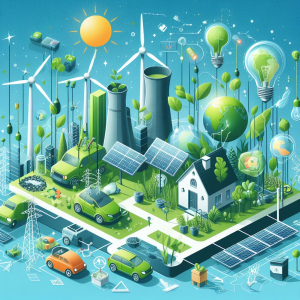Policy Brief: Seeding Success – Cultivating a Thriving Green Entrepreneurial Landscape
Undeniably, green entrepreneurship entails the promise to boost societal and economic welfare within the EU. Beyond facilitating the transition towards environmental sustainability by utilising renewable energy and minimising waste, green entrepreneurship catalyses innovation to achieve climate objectives and enhance citizen well-being.
 From a market perspective, green products and services contribute substantially to job creation while developing a skilled workforce and reducing long-term costs through energy efficiency and waste reduction.
From a market perspective, green products and services contribute substantially to job creation while developing a skilled workforce and reducing long-term costs through energy efficiency and waste reduction.
The transformative potential of green entrepreneurship can influence Europe’s energy future in a plethora of domains ranging from reducing reliance on fossil fuels and achieving carbon neutrality to cultivating environmentally-friendly consumer behaviours that adopt energy-saving practices, thus increasing inclusivity in access to energy, e.g. also for marginalised groups.
However, this shift towards a green economy would preemptively require supportive regulations and incentives so that green entrepreneurship attracts investment from both public and private sectors. In the path towards environmentally conscious and sustainable entrepreneurship, this policy brief explores the challenges that green SMEs and startups currently face. Next, the policy brief proposes solutions, serving the objective to foster green entrepreneurship at EU level and beyond.
From Green Dreams to Realities: Navigating the Hurdles of Green Business Ventures
Constituting an essential part of the green economy and contributing to a more sustainable future, green SMEs combine positive ecological and social changes with viable economic models. This positive impact is accomplished by using our planet’s resources conscientiously and sparingly to develop novel products and services in sectors such as renewable energy, circular economy, mobility, construction, and FoodTech. Nevertheless, green tech SMEs and startups may encounter several obstacles hindering their growth.
To begin with, as significant upfront investment is oftentimes required, securing funding and access to capital can be challenging, which limits the ability to scale and innovate. This can be exacerbated by the continuous, resource-intensive innovation efforts to improve and test novel R&D solutions, in order to facilitate market adoption and integration into energy systems and infrastructures. Furthermore, beyond the aforementioned technical complexities, regulatory hurdles and compliance can be daunting for SMEs and startups navigating a complex regulatory environment.
From a market perspective, high TRL levels and technological maturity are required for green- and clean-tech products and services in order to present alternative solutions, comparable with established, non-green technologies. Substantial investment in resources and time is required to acquire and develop domain technical competences and innovative solutions, which may ultimately encounter barriers to entry due to risk aversion and lack of consumer awareness and demand for green technologies.
In the digital energy sector, challenges that arise pertain to data security, privacy and ethical use of data. More specifically, digital energy products, e.g. smart management systems, process sensitive personal data, thus requiring reliable data security and privacy measures to build customer trust and boost adoption. Regulations governing data protection, e.g. GDPR, should be coupled with robust security measures, considering that the energy sector pertains to critical infrastructure, and could be increasingly targeted by cyberattacks. The integration of diversely interconnected energy systems raises the significance of securing data flows and protecting privacy to ensure system reliability and efficiency.
Despite these hurdles, measures can be implemented to overcome these challenges, ultimately ensuring that green tech SMEs and startups receive the required support in order to flourish. Sufficient comprehension of the particularities of this sector spurs the co-design of solutions and measures, which would ensure that the EU overall meets its sustainability goals, encompassing a thriving green tech sector.
Transforming Green Challenges into Blooming Business Opportunities
An Emphasis on Green Entrepreneurs
It is recommended to fund and support entrepreneurs and startups with an emphasis on greenpreneurs that yield innovation in the spheres of sustainability, renewable energy, and environment. These innovative spheres are interconnected with improving societal welfare.
For instance, more environmentally friendly cities and districts tend to provide a higher standard of living overall, lower crime rates, and greater work and education opportunities than cities and districts that suffer from hazardous environmental circumstances. Hence, investment in green entrepreneurs and startups that tackle sharp, local problems could be prioritised. An example of this could be the investment in startups that focus on the improvement of air quality within one of Poland’s biggest and at the same time most polluted industrial city of Krakow.
Stimulation of Green Entrepreneurship through Investments and Financial Mechanisms
SMEs are often considered the backbone of the national economy because of their inherent diversity and positive impact on social and economic welfare by means of job and market creation. For example, in the European Union, over 58.6% of added value is generated by SMEs. Thus, it can be concluded that green transformation can be derived from the bottom up. Considering this, it can be suggested to stimulate green entrepreneurship via investments and diverse financial instruments such as tariffs, subventions, tax reliefs.
Improvement of Market Conditions for Green Entrepreneurs
In order to co-create and establish prosperous conditions for new market entrants, particularly green and innovative startups, it is essential to ensure a coherent and clear regulatory framework at European level, minimising bureaucratic barriers. Oftentimes, bureaucracy is slowing down the growth of innovative industries, also within the green entrepreneurship sector, thus hindering potential market entrants from developing their ideas and marketing their innovative energy solutions. Market entry conditions for such green startups and SMEs could be improved substantially by capacity-building programmes for green technologies, which would simplify sustainable access to funding.
Improvement of Education on Green Economy and Entrepreneurship
It is worth considering that sustainability and a stronger focus on the environment are particularly significant for younger and future generations, which will be intensively confronted with issues pertaining to climate change. Therefore, it would be of utmost importance to improve the literacy and knowledge on green businesses and entrepreneurship among the youth. In this regard, school and university curricula should be constantly updated, providing opportunities for the younger generation to actively participate in competitions, initiatives and programmes that stimulate innovation in the spheres of environment, climate and sustainable economy.
Conclusion
Concluding, green entrepreneurship constitutes the driving force for a sustainable future, with green SMEs and startups impacting diversely and substantially social welfare at local, European, and global levels. However, for green entrepreneurship to fulfil its potential, sufficient funding through robust financial mechanisms, regulatory support and inclusive access to sustainability-oriented skills and curricula are required.
Financial incentives such as grants, low-interest loans, and tax benefits can significantly lower the barriers to entry for aspiring green entrepreneurs. Additionally, educational programs tailored to green business practices can equip entrepreneurs with the knowledge and skills necessary to succeed in this growing field. By investing in green businesses, we not only contribute to the economy but also enhance citizen welfare by accelerating the adoption of eco-friendly technologies and practices.
From a socioeconomic perspective, SMEs and startups can increase inclusion and reduce poverty, social exclusion and unemployment, while providing diverse opportunities for skills development. Thus, creating a fertile ground for green innovation ultimately leads to a healthier planet and a more resilient economy, reinforcing the commitment to the well-being of our environment and future generations.
Leitung Wissens- und Technologietransfer, Koordinatorin von EU-Projekten // Head of Knowledge and technology transfer, Coordinator of EU Projects
Stellvertreter Kommunikation und Verbreitung PLATOON // Communication & Dissemination Deputy




Eine Antwort auf “Policy Brief: Seeding Success – Cultivating a Thriving Green Entrepreneurial Landscape”